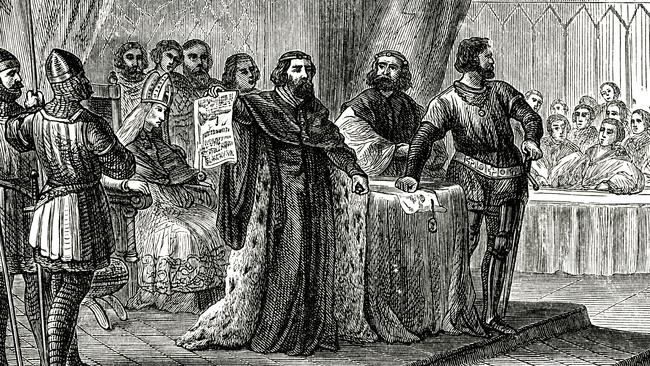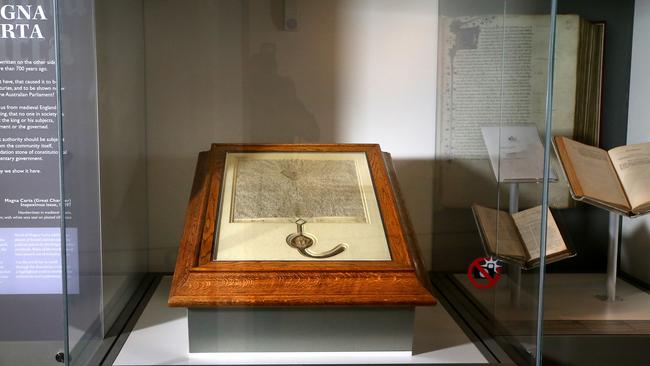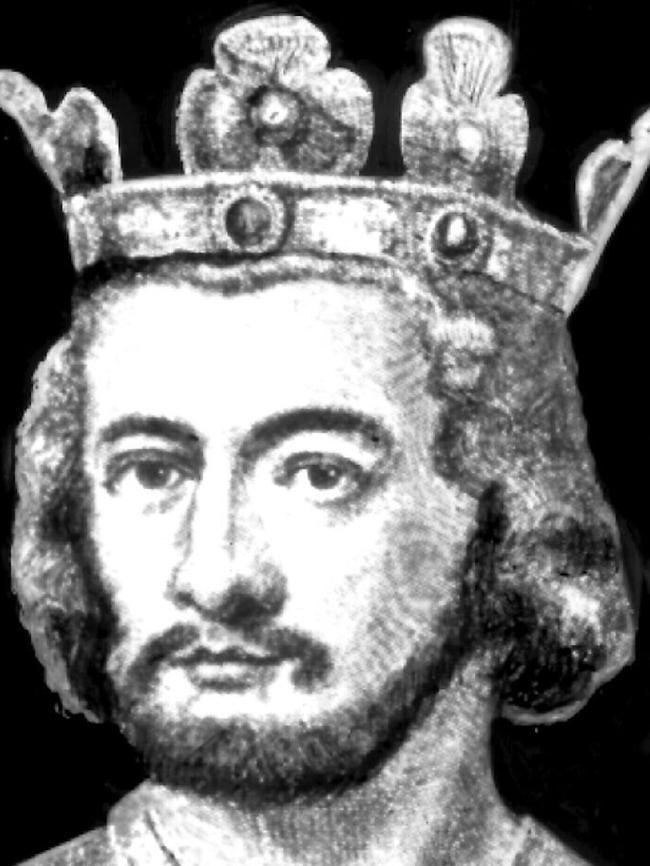King coerced into signing great charter of democracy
Lauded during 800th anniversary celebrations as England’s “greatest export”, the Magna Carta that inspired liberal democracy around the world was immediately annulled by a medieval pope as the work of Satan.

Today in History
Don't miss out on the headlines from Today in History. Followed categories will be added to My News.
Lauded during 800th anniversary celebrations as England’s “greatest export”, the Magna Carta that inspired liberal democracy around the world was immediately annulled by a medieval pope as the work of Satan. And the dubious characters, including King John I, who signed the 3500-word document at Runnymede on June 15, 1215, were unlikely champions of human rights.
Most of the Great Charter, written in Latin on calfskin parchment by archbishop Stephen Langton, was repealed or rewritten within months, and another four Magna Cartas were signed in 1216, 1217, 1225 and 1297. But the 1215 document bequeathed five concepts since adopted internationally. Like Australia, most modern states take for granted the due process of law; no one being above the law; justice delayed being justice denied; no taxation without representation; and freedom of the English Church.

But Pope Innocent III decided 40 rebel English barons who forced John to sign the Magna Carta in a Thames-side meadow near Windsor Castle were inspired by Satan. In a papal bull to annul the charter on August 24, 1215, he acc-used the barons of “forcing the Magna Carta on the king by such violence and fear as might affect the most courageous of men”.
The future charter of human rights was signed as a peace treaty with discontented barons led by well-connected Essex lord Robert FitzWalter. FitzWalter had accused the king of attempting to rape his daughter Maud, and made death threats against the monarch.
Recorded as an unscrupulous character, FitzWalter was born in about 1180 as heir to 66 knights’ fees, and added 32 through marriage. Left with fellow rebel baron Saer de Quincy, later earl of Winchester, in command of Vaudreuil Castle, a key defence against the French in Normandy, in 1203 they surrendered it to French King Philip’s army without taking up arms, provoking acc-usations of cowardice or collusion with the enemy. When John later tried FitzWalter’s son-in-law, Maud’s husband Geoffrey de Mandeville, for murder of a court clerk, FitzWalter turned up at court with 200 armed knights, daring John to hang de Mandeville.

John was born on December 24, 1166 at Beaumont Palace in Oxford, to Henry II and Eleanor of Aquitaine, heads of the house of Angevin, based in the Loire Valley in western France. As acting king he was accused of intrigues against his absent brother Richard the Lion-Heart, then fighting with the Third Crusade. Portrayed as Bad King John in the legend of Robin Hood, which dates to his reign, John became king in 1199 when Richard was killed in battle in France.
In a reign dominated by war, John lost Normandy and almost all other English possessions in France to Philip II of France by 1204. He spent the next decade trying to regain them and was finally defeated by Philip II at the Battle of Bouvines in Flanders in July 1214.
After a quarrel over the appointment of Parisian theologist Langton as Archbishop of Canterbury, instead of John’s choice, Bishop of Norwich John de Grey, Pope Innocent III put England under an interdict in 1208. This closed the churches, mass was not celebrated and coffins were suspended from trees in church yards, awaiting the time when the dead could be buried in consecrated ground.
When John confiscated church property, arguing priests were not carrying out any work, Innocent excommunicated him in 1209. John’s excommunication also let barons off their oath of loyalty. Fearing their rebellion, John acted quickly. Accused of plotting to kill the king during a failed rebellion in 1212, FitzWalter was outlawed and fled to France. As barons rebelled against excessive taxes, or scutage, to fund John’s wars, pious English citizens blamed the king for closing the churches.
Aware of French King Philip’s preparations to invade England, in 1213 John decided to accept the Pope’s choice of Archbishop in hopes that Innocent would dissuade Philip. This also allowed FitzWalter to return and, with other barons, make peace with John. But within months of John’s return from France in 1214, he found rebel barons in England’s north and east were again organising resistance under an oath to “stand fast for the liberty of the church and the realm”.
At a council in London in January 1215, John discussed potential reforms as both sides appealed to Innocent for assistance. Rebel barons produced an initial document which drew on Henry I’s Charter of Liberties, which they believed defended their rights. Seven articles from that document later appeared in the “Articles of the Barons” and the 1215 charter.
Barons gathered in May to renounce feudal ties to John. Marching on Lincoln and Exeter, they captured the Tower of London on May 17. John ordered Langton to organise peace talks, which produced the celebrated great charter.
Originally published as King coerced into signing great charter of democracy


